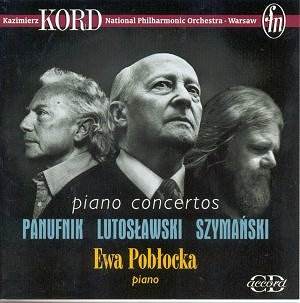Three
Polish piano concertos of the twentieth century. All are very
much of that century.
Panufnik
differs from the other two in that he wrote this work in England
whence he had fled after the pogroms of the late 1940s. For several
years he conducted the City of Birmingham Symphony Orchestra.
He wrote the concerto in Duckenfield and conducted the premiere
given by the CBSO on 5 January 1962. The soloist was Kendall Taylor.
The work was revised in the early 1980s and the composer conducted
the BBCSO in this new version on 8 July 1983. The pianist then
was the redoubtable John Ogdon. I heard the earlier version in
a BBC Scottish SO 65th birthday concert in the 1970s when
the soloist was Malcolm Binns. Ogdon was however a most apposite
choice of soloist for he relishes the keyboard cannonade and orchestral
salvoes that erupt throughout the first and last of three movements.
This is violence without much dissonance - one can look at Peter
Mennin's 1960s Piano Concerto (also wondrously championed by Ogdon
on CRI) for a parallel certainly in the context of the splenetic
activity. With Panufnik peace is rarely far from action and so
it proves with the meditative Molto tranquillo. He convinces
you that this peace has always been there continuing under the
brutality of battle but revealed when battles end. The piano part
amid the modest string anthems is somewhat Bergian. The piano
part in the finale is aggressively jazzy, active, on its toes.
Pobłocka makes hay with this, surmounting all technical challenges.
She has in her a superb Bartók cycle ... if only she can be lured
back into the studio.
The
Lutosławski skitters and swerves, chitters and moans,
groans and rumbles, endlessly inventive in its virtuoso deployment
of the full resources of an orchestra. It is almost as if this
were by Messiaen without his fragrant spirituality. This is a
work that is written in knowledge of the achievements of Penderecki
and Sessions. There are though moments of high romance as in the
presto at 2.19 where the hammered piano chords sur-top
exciting orchestral writing suggesting some Rachmaninovian climax.
The movements, of which there are four, are played attacca.
My only criticism is that the fast music is all rather unremitting
though much can be forgiven for the way the composer ‘engineers’
the last four exciting minutes.
Szymański's
concerto is in one big movement which starts with sequence after
sequence of note-groups like a Bach fugue deconstructed and reassembled
with hesitations inbuilt. This retreats into an enchanted whistling
kingdom rather like late Tippett in lyrical mood (middle movement
of Triple Concerto). Melody is suggested not stated. A warm tense
updraft of quiet high writing for the violins boils mercilessly
upwards. This work impresses rather than endears and it suffers
from an ending that happens rather than seeming ordained by all
that has preceded it. Certainly a work to return to.
Rob
Barnett
MusicWeb
is now selling the CDAccord catalogue

![]() for
details
for
details